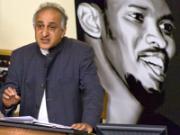
"On October 19, 1977, numerous black consciousness organisations were banned and scores of political activists were detained in the aftermath of the Soweto uprisings and the killing of Steven Bantu Biko on 12 September 1977, and one of the organisations that was banned was the South African Students Organisation (SASO)," said Rhodes University vice-chancellor Dr Saleem Badat during the launch of his book, Black man, you are on your own, on Monday.
The book, which is about SASO and it's role in the fight against apartheid, "analyses the ideology, context and organisational features" of the organisation and "assesses its contribution to the struggle against apartheid education, race, class and gender oppression in South Africa," said Badat.
SASO was the black consciousness movement student organisation which was formed by black university students in 1968 and led by Biko after they broke away from the non-racial National Union of South African Students (Nusas) because they felt that Nusas did not address the needs of black students in a radical way.
Baday says SASO was formed at a time when black people faced oppression from the apartheid government's racial policies and black universities were not designed to "produce dissidents but had been charged with the responsibility of winning students intellectually and politically to the separatist development programme" of the apartheid government.
The title of the book is taken from a quote by SASO leader, Barney Pityana, and "expresses the sentiments and context of the 60s "when blacks were suffering because of legalised discrimination and the students felt that they could not depend on the whites for their thinking and organisational activities as was the case in the 60s".
Badat said the book is relevant for a number of reasons, including that we must not forget our past, and "as a rainbow nation and a non-racial society it is all too easy to neglect to ask how far the past has been transformed".
Badat said the contribution of SASO and its student militancy and courage in bringing about democracy has to be acknowledged and student activists in South Africa, including those at Rhodes University, appeared to be growing aversive about the history of student struggles and activism and the contribution of previous student organisations to freedom.
The book also looks at black higher education before 1960, student politics of the 50s and 40s and debunks the myth that black consciousness began with SASO, revealing that it was a process that unfolded over time.
The black consciousness movement's philosophy sought to instil pride in black people and challenged the notion that blacks were inferior to whites. Badat says it gave us assertions such as "black is beautiful, discouraged people from using skin lightening creams, encouraged the Afro hairstyle and dress that was more of an African nature and the clenched fist salute embodying black solidarity and opposition to white domination."
According to Badat unequal opportunities, unemployment, poor education, social welfare and healthcare challenges that existed at the time of the SASO generation still persist today as well as "questions of race, identity, cultural and social transformation."
He said we could learn from Biko, black consciousness, and SASO to "push to the limits the boundaries in the pursuit of social justice, equity, human rights, democracy and development." He also condemned the excessive spending at hotels by the police minister, Nathi Mthethwa, and said those who "occupy seats of power" must heed Nelson Mandela's words that "the people's patience is not endless".
The book launch was attended by Nkosinathi Biko of the Biko Foundation which makes the work of Biko available to the youth and who commissioned and financed Badat's book. Biko said the book was important as it was about the formation of SASO and black consciousness.
The launch also formed part of Press Freedom Day which commemorates the banning of three newspapers by the apartheid government on October 19, 1977.
Written by: Thando Tshangela
- This article was published on Grocott’s Mail.
